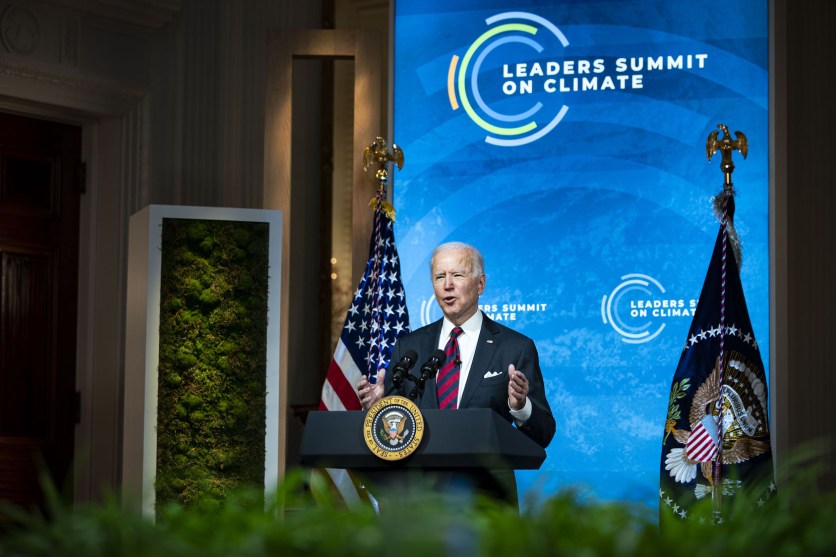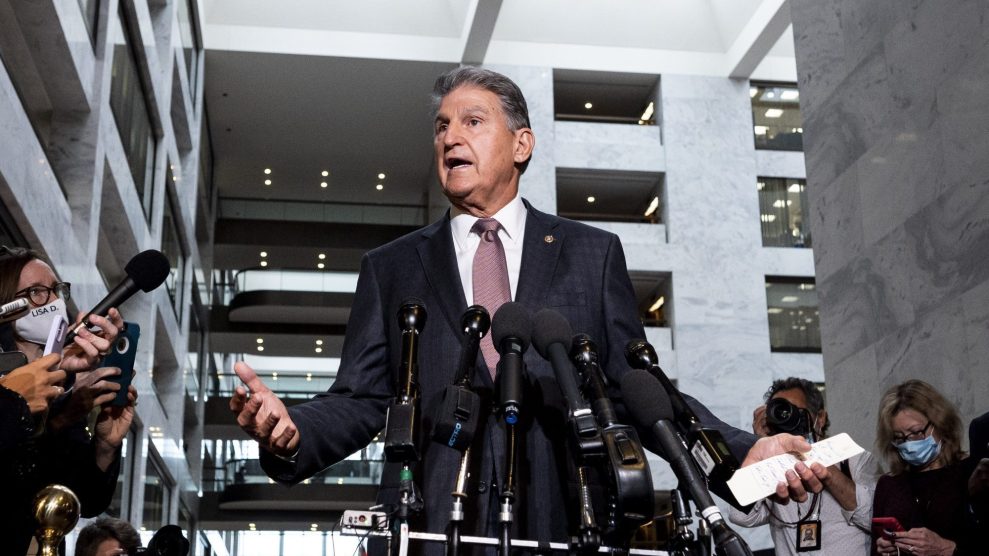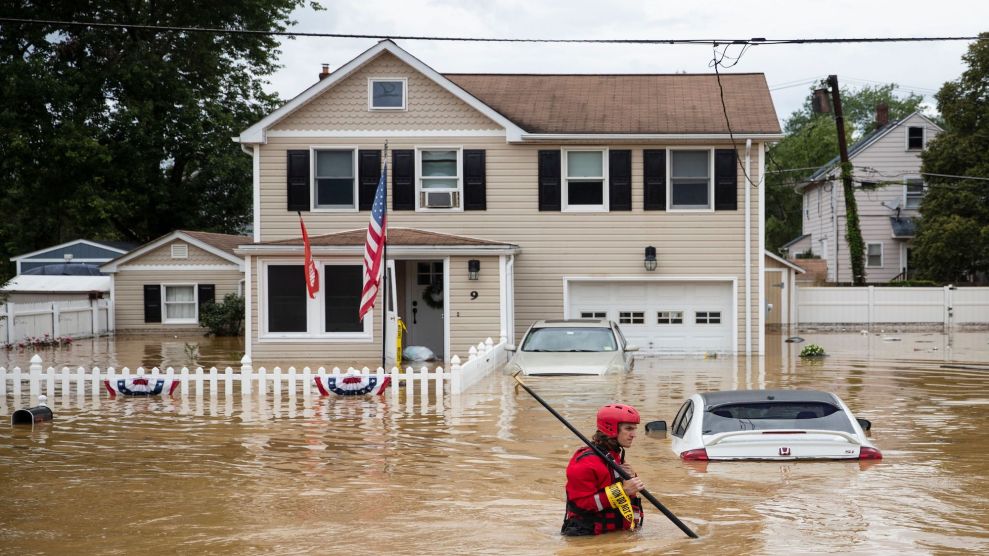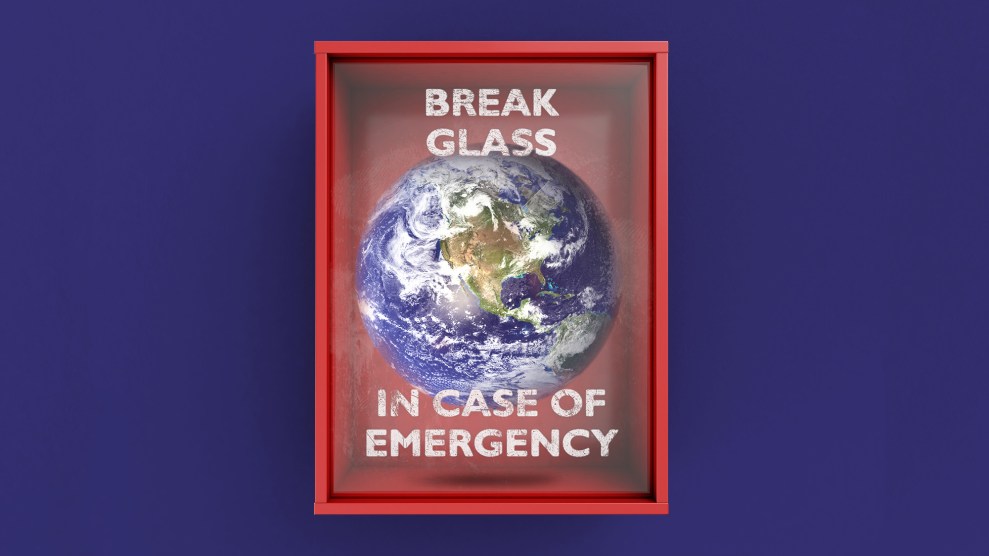
Al Drago/The New York Times/Bloomberg
Less than a week out from COP26, the UN Climate Change conference, the United States has yet to develop a solid plan to rein in climate change. Opposition from Sen. Joe Manchin, the West Virginia senator with deep ties to energy industries, has stripped the Clean Electricity Performance Program (CEPP) from the Democrats’ spending bill, removing roughly a third of the hoped-for emissions cuts and crippling the Biden administration’s goals of weaning America off fossil fuels and slashing net greenhouse-gas emissions to roughly half of their 2005 levels by 2030.
President Joe Biden last week announced a “Plan B” to meet emissions pledges without the CEPP—by using wind and solar energy incentives, new regulations, and clean energy laws. And while an analysis shows that such policies may help the US hit its emissions targets, there will be significant obstacles to their implementation. The Plan B also sidesteps meaningful fossil-fuel regulation, which is needed to curb global warming.
“The simplest way to look at the climate problem is fossil fuel production, because three quarters of global emissions and 80 percent of US emissions come from oil, gas and coal. So we cannot continue to produce more than we can afford to burn and still stay below the temperature guard rails,” notes Kassie Siegel, director of the Center for Biological Diversity’s Climate Law Institute. I called Siegel to talk about what lies ahead at COP26 next week—and what a weakened US climate policy means for the rest of the world.
Without a clear path, environmental advocates fear that world leaders will fail to meet the urgency of this moment. Some, Siegel included, are calling on Biden to circumvent lawmakers and address climate through executive action. “It’s always been entirely predictable that we would be where we are right now with Congress, because this is where we’ve been for 30 years with Congress,” she told me. “Biden needs to transcend that thinking, realize that Joe Manchin is going to do the bidding of fossil fuel companies, and actually be the climate president we need, because we’re simply out of time.”
The following interview was edited for length and clarity.
What will be the effect of Congress scaling back the proposed climate spending?
That’s up to President Biden. The President has really broad powers under existing law to do so many of the things that need to get done to reduce US greenhouse gas emissions and to bring the kind of package that he needs to bring to Glasgow in order to have success there. Additional spending from Congress would certainly be welcome, and is very important.
If the US isn’t meeting its emissions targets, how might developing nations respond?
Less action, to the detriment of everybody. That is what we’ve seen. The Clinton Administration went to Kyoto in 1997 and made a lot of commitments in terms of clean energy finance to countries like China and India, and then reneged on those. And then we saw a massive coal buildout in those countries. That didn’t have to happen. The irony of US politicians continuing to blame the current situation on China and India is that that happened in large part because the US reneged on its commitments.
Is it accurate to say that the US can make or break the effectiveness of the summit?
Yes. President Biden is going to make or break Glasgow, that is absolutely correct.
What are some executive actions Biden can take?
The number one thing is federal fossil fuel production. Twenty-five percent of US greenhouse gas emissions come from oil, gas, and coal that is publicly owned. It’s held in trust for the American people by the federal government. Historically, the government has auctioned it off to oil, gas, and coal companies for development and that needs to stop.
It is absolutely absurd for the federal government to be holding additional oil, gas, and coal lease sales—because there’s already enough oil, gas and coal in developed reserves to blow way past 1.5 degrees and 2 degrees. President Biden has promised to do this and also to wind down existing extraction on federal land. And he can do that under existing law, onshore and offshore.
What other executive actions are available?
The president can and must declare a climate emergency under the National Emergencies Act. This is important for communicating the urgency of the problem, but it also unlocks emergency powers that the president can use. Generally, Congress controls the purse strings, but with emergency powers Biden can redirect a portion of military spending towards renewable energy infrastructure, for example.
He could also reinstate the crude oil export ban. When we were at the Paris climate talks in 2015, Congress lifted the 40-year-old ban on crude oil exports. This was because the North American fracking boom was just getting going. Lifting the ban just completely supercharged that. Crude oil exports shot up 750 percent, so that a quarter of US oil production is currently being exported. To put that ban back in place, in conjunction with these other policies that we’re advocating, is a really important piece of this. The only thing that Biden needs to do to reinstate that ban is to declare a national emergency.
Do fears of political repercussions play a role in Biden’s reluctance to take these actions?
They probably do, but I think those concerns are misplaced. For my entire career, the idea has been “if we just do a little bit, if we just pick the easy things, and we just get some compromise, and we just get some members of Congress to go along with it, then we’ll set ourselves up and then we can go faster later.” That approach has failed.
The fossil fuel industry and the politicians who are doing their bidding are going to throw everything they have into opposing climate action. The industry has lied for decades about climate science, has funded this massive disinformation campaign, and has blocked progress. In order to have a fighting chance at maintaining a livable planet, we need Biden to actually start taking the big, bold, transformative actions. He can do that under existing law.
If not, what happens?
If the Biden administration settles, that means climate catastrophe. We’re out of time for half-steps on climate. The United States is the world’s largest cumulative greenhouse polluter. We’re on a bus speeding toward the climate cliff and easing up on the accelerator a little bit is not going to prevent us from going over the cliff. We need the driver to slam on the brakes. And that’s what Joe Biden has to do.
One criticism of doing things by executive action is that they can be rolled back pretty easily by the next president.
Not everything can be rolled back necessarily. I agree with the premise that the next president can come in and reverse a lot of things. But that takes time. And when you put good, strong transformative policies in place, and they have several years, three years or seven years, to get going, we’re going to start reaping the benefits. As a practical matter, even if you have another pro-fossil-fuel, climate-denying president come in, they’re not going to be able to reverse it all.
President Obama withdrew a large portion of the Atlantic and Arctic oceans from offshore oil and gas development and we were in litigation over whether Trump could come in and undo that and we won in district court. Good, strong policies for what happens in the very near term are in place for three years. Even if another disastrous president comes in and tries to reverse it, in many ways they will not be able to do so. Trump did everything possible to revive the coal industry, but he couldn’t.
How might a pared-back US agenda deincentivize other nations?
The effect is tremendous. The United States for many, many years has been one of the top barriers to good, strong agreements and international progress. So it is essential that Biden take strong commitments to Glasgow. If he can’t get them out of Congress, he needs to bring them himself.
Biden has made statements suggesting he will still promise a strong commitment in Glasgow regardless of what happens with the spending bill. Will other nations buy that?
They’re not going to listen to it if he doesn’t go to Glasgow with a good package. And time is short. Biden can do it with the stroke of a pen. The Obama administration went to Paris and said, “Okay, here’s what we’ve done. And here’s what we’re gonna do.” The Paris Agreement is far from everything we need, but that’s why we have what we have. Climate targets and that agreement about what needs to happen to limit warming to below 1.5 degrees are because Obama went there and said, “I can put some commitments on the table.” Biden needs to do that, but so much more and so much faster.
What makes a strong climate package?
A good package has to be fair, ambitious and binding. Biden needs to commit to science-based reduction targets. Scientists have said we need to cut greenhouse emissions in half in the next decade to have a fighting chance. The US is the richest country in the world—the world’s largest cumulative climate polluter. It needs to be doing better than the global average, so it needs to be going 70 percent or more in reductions over the next decade, and then put in a lot of finance and support for developing countries that are already suffering appalling loss and damage from the crisis. There is this huge gap between the agreement to limit warming to below 1.5 degrees and what countries need to do to achieve that. The most important thing is not the promise for 2050. It’s the promise for the next decade.
You’re saying because we’ve long been the world’s biggest carbon polluter, we should now sacrifice more?
Yes. The United States in the 1990s agreed to do so. That was the basic agreement—that the richest countries who did the most to cause the problem would also do the most to fix it. And yet, having agreed to that, successive administrations have instead tried to blame the developing world.
Do individual US states have a key role to play in all of this?
Absolutely. Leadership at the state level is absolutely important. That is why we have been pressing Governor Newsom on California’s dirty oil production—to actually join the first movers of the world in limiting fossil-fuel production. Governors, sub-national leaders from around the world, can definitely demonstrate leadership, and use their executive authority to get it done.
What are your thoughts on Biden’s so-called Plan B?
It’s my assumption that that’s not fully fleshed out yet. There is not enough in what the administration has announced to get us where we need to be. I think executive action should have been Plan A. That would have made far more sense, because that’s what Biden has total control over. Obama did the exact same thing: The administration said, “We’d like to pass climate legislation, but if we don’t, we’ll use our executive authority.” That just doesn’t make any sense. We’re in a climate emergency. The president needs to use all existing authority to move everything forward as quickly as possible, and then also try to get Congress to do its part. I don’t think the Plan B framing makes any sense and I would urge the administration not to use that.
What do you expect will come out of COP26?
The big thing is to up the commitments on emissions and fossil fuel production. There’s a huge gap between what needs to happen to limit warming to 1.5 degrees, and what countries have pledged. There’s a huge gap between the amount of oil, gas, and coal that can be dug up and burned and what the world’s fossil fuel producers are planning to do. Those gaps have to be narrowed by countries upping their emissions reduction pledges.
Does it seem possible the summit will result in the world meeting its emission targets?
That is extremely unlikely. However, we have to keep demanding it.
What authority will an international climate treaty have?
Enforcement is always very difficult. The United States agreed to do certain things back in the 1990s. It hasn’t done them and, unfortunately, there has been no consequence. It’s a global problem and we need a global solution—we desperately need international cooperation. The power of having a treaty each country has agreed to and will be accountable to is very important. To create the international norm, that world leaders will work together to get it done is incredibly important. We can’t underestimate the power of making that happen.
Do you think it’s problematic that a lawmaker like Joe Manchin, who is backed by fossil-fuel interests, is allowed to dictate climate policy?
Absolutely. This is a moral issue. It’s a question of life or death. The politicians who are opposing [ambitious reforms] are doing it for the sake of fossil fuel corporation profits and their own financial gain. And it’s morally shocking.















